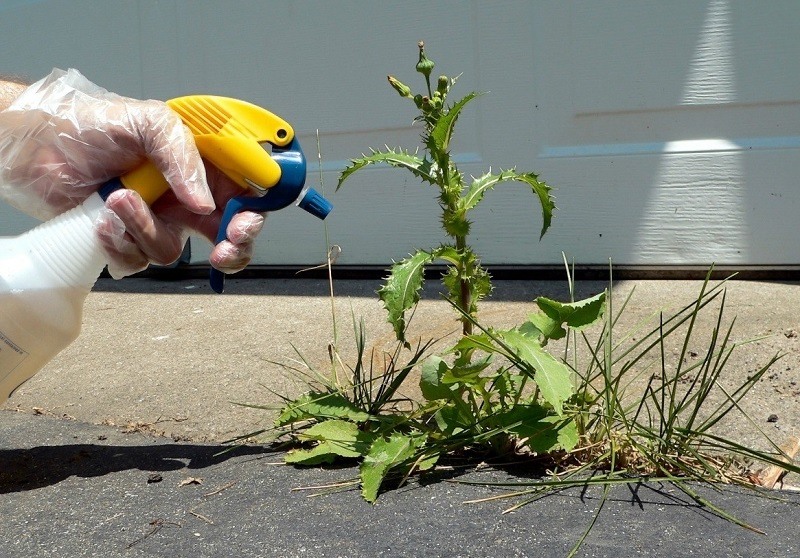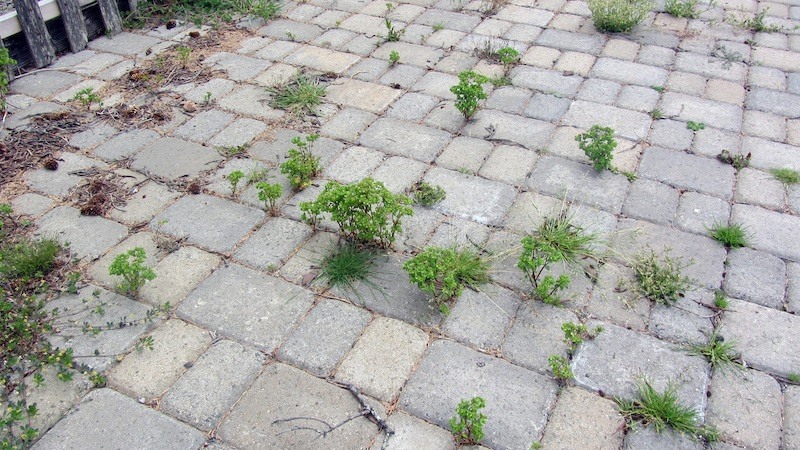When I bought my first house about two years ago, I struggled with eradicating weeds in my lawn and on the driveway. But through expensive trials and errors, I realized that bleach kills weeds with ease.
So, does bleach kill weeds? Yes. Undiluted bleach lowers the soil pH around the weeds. Most weeds do not thrive in an acidic environment. The sudden changes in the soil pH eradicate the weeds permanently.
Keep in mind that the bleach will kill any vegetation close to the weeds. Do not apply bleach as a weed killer in the lawns and flower beds. The soil acidity has a long-lasting effect that inhibits weeds and grass from growing back.
I recommend spot-treating weeds with bleach due to their nonselective nature. Bleach is ideal for killing weeds along the sidewalk, driveways, gravel, and patio pavers. Be sure to exercise precautions when using this homemade weed killer to control weeds.
Keep reading this article to learn how to use bleach as a weed killer. The information also highlights some of the best alternative weed killers to bleach. Let’s find out that together now:
You May Also Enjoy: Why Is My Pilea Drooping?

Will Bleach Kill Weeds and Grass Permanently?
Weeds and grass do grow in the driveway and other unattended landscaping areas. Most homeowners prefer to use herbicides like bleach to eliminate them. But the technique tends to put other vegetations and grass into danger after application.
So, will bleach kill weeds and grass permanently? Yes. Undiluted bleach is an acidic chemical that eliminates weeds and grass in the pavements or driveways. It creates an acidic environment that prevents grass, weeds, and other vegetation from growing.
Bleach is super effective in killing weeds in the sidewalks, patio pavers, and driveways. You will need to exercise precaution to avoid harming your flower gardens and lawn. Reviving grass and flowers damaged by bleach is impossible.
Continue reading to learn how to get rid of weeds using bleach without killing the grass. Keep in mind that bleach is corrosive and can irritate your skin or eyes. Besides that, it can cause staining and damage to concrete surfaces.
Is It Safe to Use Bleach as a Weed Killer?
Bleach is an acidic chemical ideal for removing stains, whitening clothes, and disinfecting surfaces. Its content can also kill weeds in rocks, sidewalks, and driveways. The application inhibits the growth of new ones.
So, is it safe to use bleach as a weed killer? No. Bleach is a hazardous chemical that affects soil health and leaves harmful residues after spraying. The chemical components seep into the groundwater to cause pollution.
Some local authorities in the United States consider bleach an illegal herbicide. Be sure to check with your local authority regulations regarding weed control before using homemade bleach as a weed killer.
The bleach spray tends to kill critters living in the soil and reduce its fertility. The chemical residues might irritate the skin of your pets while taking a soil bath. Restoring soil fertility and treating pet skin irritation is super expensive.
How Does Bleach Kill Weeds?
Bleach is an acidic chemical that lowers the soil pH making it difficult for vegetations to survive and grow in the near future. The chemical components denature the plant cells and whiten leaves that come in contact with it.
The nonselective nature of bleach makes it unsuitable for use as a typical weed killer. But it is ideal for controlling weeds in areas that vegetation is not needed. The best places to use bleach as a weed killer are driveways, sidewalks, and patio pavers.
Do not spray bleach in flower beds, vegetable gardens, and lawn grasses. Use plastic sheeting when using chlorine bleach near plants to prevent accidental spillages. Avoid using bleach near a storm drain or water bodies since it is harmful to aquatic life.
How Long Does It Take for Bleach to Kill Weeds?
Bleach is super acidic to inhibit vegetation survival in the applied areas. The chemical content tends to make weeds turn brown, wilt, and droop. All these are the common signs of dying weeds due to the Clorox bleach action.
So, how long does it take for bleach to kill weeds? About 2-3 days. The weeds start by drooping, turning brown, and eventually wilting. But the duration depends on the nature of the weeds and the strength of the bleach.
Some weeds might take up to four days to dry. Undiluted Clorox bleach tends to be more effective in killing weeds than its diluted counterpart. Soft and juvenile weeds take a single day to droop and wilt.
How to Use Bleach to Kill Weeds Safely?
Clorox bleach is super corrosive and irritating. You will need to wear waterproof hand protective gloves (Check the Best Deals on Amazon) before spraying undiluted bleach over the weeds.
Use one cube of bleaching liquid to kill vegetation in a six-by-six yard. The acidic chemicals will take two to three days to eliminate the weeds.
Most weeds begin to turn brown, drooping, and eventually dies after bleach application. I recommend pulling the weeds and allow them to decompose.
Remember to flush the soil if you plan to grow other plants in the area to leach the chemicals. You can also alter the soil pH by dissipating the chemicals to make the area safe.
Keep in mind that bleach kills weeds, insects, and other plants. The chemical residues can irritate the skin of your child and pets. Avoid mixing the bleach with any other chemical.
What Kills Weeds Permanently? (Best Alternatives)
Clorox bleach has a higher concentration of chlorine that might harm the soil in your yard. The chlorine kills microorganisms that add nutrients to the soil to cause infertility.
I recommend going for the best alternative bleach homemade weed killers. They are safe and effective choices for those looking to grow other plants in the area. They include:
Use Vinegar with Salt
Use undiluted vinegar and add few spoons of dish soap to form a solution. Spot-treat the weed with the solution repeatedly until the weeds are eradicated. (Check Best Deals on Amazon).
Use Salt Solution
Mix salt in hot water to form a solution and pour the solution over the weeds growing in the cracks for several days. The salt dehydrates the plant cells by making them die. Hot water is meant for denaturing plant cells.
Commercial Weed Killers
These herbicides are super expensive and come in different concentrations that eradicate the weeds permanently. Be sure to read and understand the instructions before using them. Avoid any contact with edible gardens and use them away from children. (Check the Best Deals on Amazon).

Final Thoughts
Bleach is a non-selective type of herbicide. It can kill anything that comes into contact with it permanently. Bleach can eradicate weeds, grass, and other undesirable plants.
The homemade bleach lowers the soil pH and creates an environment where vegetation cannot thrive even soon. Bleach is not eco-friendly despite killing all types of weeds.
I recommend using bleach on concrete surfaces to eliminate weeds from the cracks. Avoid spraying bleach around the edible gardens and flower beds.
